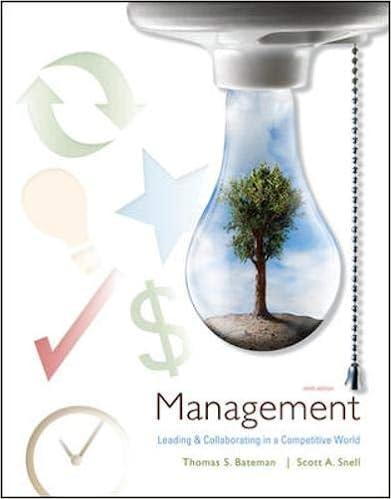ExxonMobil is the largest publicly traded oil company in the world. It conducts business in more than
Question:
ExxonMobil is the largest publicly traded oil company in the world. It conducts business in more than 200 countries and territories. Fortune magazine ranked ExxonMobil, located in Irving, Texas, Number 2 in its Fortune 500 annual listing. In addition, 2004 represented a banner year for the company. It earned more than $25 billion for the year and a record $8.42 billion in the 4th quarter alone. Sales earnings for the year were close to $300 billion, a staggering amount of money for any company by any account. Despite its stellar financial performance, over the years ExxonMobil has encountered some very serious problems that have in one way or another affected the domestic and international affairs of the company. For example, Exxon, before it merged with Mobil in 1999, never really erased its image problem as a result of the 1989 Exxon Valdez debacle—when an oil tanker, the Exxon Valdez, spilled more than 10 million gallons of crude oil into Prince William Sound, Alaska, creating an ecological nightmare that almost destroyed this once pristine Alaskan environment. Instead of owning up to the disaster immediately, company management attempted to shift the blame to third parties—the U.S. Coast Guard and the Alaskan governmental agencies; furthermore, the company took what some observers considered an excessive amount of time before management directly addressed cleanup efforts. Incidentally, Exxon paid fines and environmental restoration fees of some $3 billion. Just last year, ExxonMobil was embroiled in a mega oil bribery scandal. Some top executives were charged by the U.S. Federal Government with attempting to bribe leaders in several African, Asian, and newly independent former USSR satellite countries to secure oil rights. At its annual general meeting in May 2005, slightly more than 28 percent of ExxonMobil shareholders voted on a proposed resolution to force the company to comply with the Kyoto Protocol treaty which calls for the reduction in greenhouse gas emissions. The Kyoto Protocol treaty has been ratified by 140 countries; the United States is one of the countries that has not signed the treaty. Some company critics have openly voiced the opinion that ExxonMobil has failed to meet its corporate responsibility. In addition to these problems, ExxonMobil needs to resolve other issues. For example, some conflict-ridden oil-rich countries may interrupt the flow of the oil supply and thereby cause the price of oil to fluctuate dramatically. These issues may have an adverse condition on the company’s balance sheet, although the recent decline of oil production has not hurt ExxonMobil’s profits to date. The company has a very strong cash position and is considered cash rich as a result of fiscal prudence of its long-time chairman and CEO Lee Raymond. According to some estimates, cash accumulations approach the $25 billion mark and there are no plans to spend the money. If ExxonMobil’s profits continue, financial projections suggest a nearly $40 billion cash position by the end of 2006. Yet this enviable financial position has created another problem for ExxonMobil. Management has been reluctant to invest in new oil exploration opportunities or to begin the process of building new refineries in the United States. These current issues present one set of problems for the company. A lesser problem may occur when Chairman and CEO Raymond retires. Rex Tillerson, a 51-year-old civil engineer and 30-year Exxon employee, who began his career as a production engineer, has been designated as Raymond’s heir apparent. During his tenure at Exxon, Tillerson has worked in a variety of managerial capacities. He possesses intimate knowledge of both domestic and international markets and has had significant experience in countries such as Russia, Thailand, and Yemen. When he assumes the corporate leadership mantle, Tillerson must grapple with these issues. Can Tillerson translate his various international managerial experiences to deal with some of the key issues confronting ExxonMobil?
QUESTIONS
1. Assume for a moment that you are Rex Tillerson, CEO/ chairman heir apparent. Discuss some corporate strategy initiatives you would take with regard to ExxonMobil and the international community.
2. Define corporate responsibility. How well do you think ExxonMobil has met its corporate responsibilities?
3. Are there any other strategies ExxonMobil can implement to help improve its image and performance?
Step by Step Answer:

Management Leading And Collaborating In The Competitive World
ISBN: 9780078137242
9th Edition
Authors: Thomas Bateman, Scott Snell





